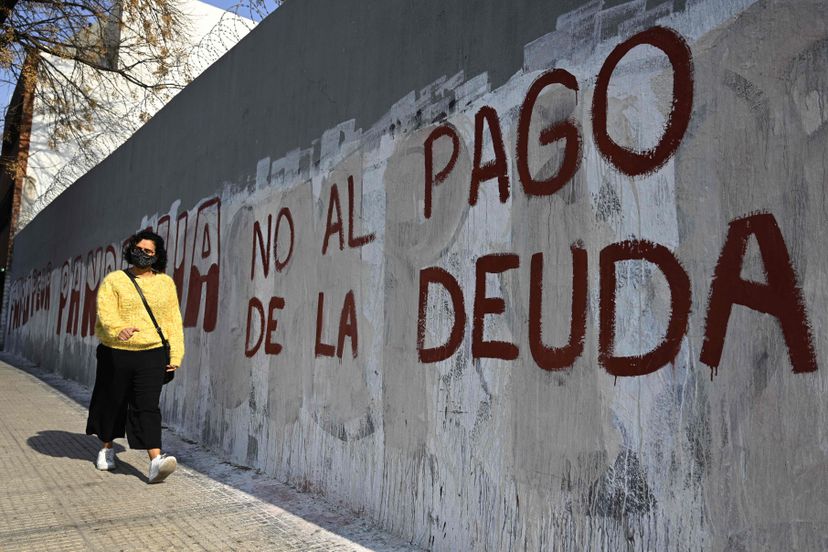RIO DE JANEIRO, BRAZIL – Argentina seems willing to postpone the restructuring of its debt with the International Monetary Fund until next year. The visit to Washington by Economy Minister Martín Guzmán achieved little more than some theoretical discussions and an agreement on the need to reach an agreement.

There are parliamentary elections in October, and the Buenos Aires government does not want to make unpopular commitments to the IMF. But the country’s situation is once again very delicate: its public debt is at default levels (despite having agreed to improved conditions with private creditors half a year ago), its country risk is increasing, and it needs to reschedule its debt with the Paris Club before May.
Minister Guzmán met on Tuesday and Wednesday with IMF director Kristalina Georgieva. On Wednesday, Vice President Cristina Kirchner added pressure to Guzmán’s task with very harsh words against the Fund: “They supported the [1976 military] coup that ended the country, they supported the British in the Falklands, and they violated all their statutes [to grant a US$57 billion loan to the previous president, Mauricio Macri]. Can’t we ask them, with all the sweetness and affection in the world, that it is time for them to do us some pleasantries?”
The “pleasantries” that the increasingly powerful vice-president was referring to consisted in giving them a 20-year term to pay back the loan (of which US$45 billion have been disbursed) and in lowering the interest rates to 1% a year (they now range from 1.9% to 4.9%, according to the installments).
This was the idea circulated by Cristina Kirchner. The next day, the IMF spokesman had to publicly remind that the loan, initially granted as a “stand-by” for a three-year term, can be transformed into an “extended fund facility” for ten years, but no longer. The new formula would mean stricter conditions because it would require Argentina to undertake fiscal adjustment and structural reforms. In the Casa Rosada, it is considered that accepting these terms before the October elections would worsen the results of the ruling coalition.
The Argentine government thinks it can afford to postpone restructuring its debt with the IMF thanks to the IMF’s sending over the next few months of an additional US$3 billion, resulting from a capital increase by the Washington-based organization. With this money, Argentina can cover this year’s payments.
The urgencies, however, multiply. In May, an old Argentine debt to the Paris Club (which the richest countries formed in 1956 precisely to deal with an Argentine debt) for US$2.3 billion comes due. Guzmán needs to settle another restructuring with the Paris Club, where the main creditors are Germany and Japan.
Investor confidence in the country, meanwhile, is once again shrinking. A little more than half a year after the restructuring agreement with private foreign creditors, the price of new Argentine bonds issued at the time has already fallen by 32%. This means that investors consider it likely that the bonds will also fall into default. It would be the tenth “default” in Argentina’s history.
It is a profitable public debt: “A bond bought today would give interest of 17% to 20% per year. The problem is that there is no demand because there is no confidence,” says economist Marcos Buscaglia. “Argentina lacks credibility, credit, and capital markets. This is going to end badly,” he adds. The country risk, the index with which JPMorgan calculates the possibility of default, reached 1,600 this week.
Another dangerous variable is the Province of Buenos Aires’ debt, which has been in default for almost a year. Argentina’s richest and most populous province owes US$7.148 billion, and its governor, Axel Kicillof, has postponed the deadline for agreeing on a restructuring a dozen times.
On Monday, March 29th, there is a new due date, and creditors seem to be losing patience. A group of them, which under the name Ad Hoc encompasses the owners of almost half of the debt, sued the Province this week in New York courts.
Kicillof asks for a three-year leniency period, a 55% interest reduction, and a 7% principal write-off. The bond owners’ lawyers said that Buenos Aires “does not negotiate how much it can pay, but how much it wants to pay according to its political interests” and that Kicillof is acting “in bad faith.” The governor, for his part, says that the residents of Buenos Aires have urgent needs and have priority over foreign creditors.
Source: El País

